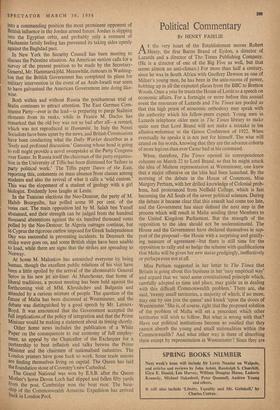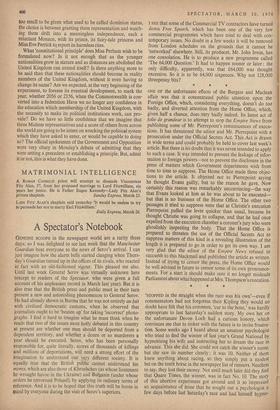Political Commentary
BY HENRY FAIRLIE
A T the very heart of the Establishment moves Robert Pl. Henry, the first Baron Brand of Eydon, a director of Lazards and a director of The• Times Publishing Company. (He is a director of one of the Big Five as well, but that seems almost an anti-climax.) For more than half a century. since he was in South Africa with Geoffrey Dawson as one of Milner's young men, he has been in the ante-rooms of power. bobbing up in all the expected places from the BBC to Bretton Woods. Once a year he treats the House of Lords to a speech on economic affairs. For a fortnight or more before this annual event the resources of Lazards and The Times are pooled so that this high priest of economic orthodoxy may speak with the authority which his fellow-peers expect. Young men in Lazards telephone older men in The Times library to make quite sure that Lord Brand will not make a mistake in his allusive •reference to the Genoa Conference of 1922. When eventually he speaks it is not just for himself. The wise will attend on his words, knowing that they are the advance cohorts of more legions than ever CEesar had at his command.
When, therefore, The Times opened its correspondence columns on March 22 to Lord Brand, so that he might attack the idea of Maltese representation at Westminster, one knew that a major offensive on the idea had been launched. By the morning of the debate in the House of Commons, Miss Margery Perham, with her drilled knowledge of Colonial prob- lems, had pronounced from Nuffield College, which is fast becoming the All Souls of the newer political sciences. During the debate it became clear that this assault had come too late, and the Government has since defined the next step in the process which will result in Malta sending three Members to the United Kingdom Parliament. But the strength of the opposition to the idea should not be underestimated. The House and the Government have declared themselves in sup- port of the proposal—the House with a surprising and gratify- ing measure of agreement—but there is still time for the opposition to rally and so hedge the scheme with qualifications that Malta will be given her new status grudgingly, ineffectively or perhaps even not at all.
Miss Perham suggested in her letter to The Times that Britain is going about this business in her 'easy empirical way' and argued that we 'need some constitutional principle which. carefully adapted to time and place, may guide us in dealing with this difficult Commonwealth problem.' There are, she said, 'twenty small territories, a majority of which, if no more, may one by one join the queue' and knock 'upon the doors of Westminster.' She is, of course, right that the proposed solution of the problem of Malta will set a precedent whiCh other territories will wish to follow. But what is wrong with that? Have our political institutions become so ossified that they cannot absorb the young and small nationalities within the Commonwealth? And what other way is there of absorbing them except by representation at Westminster? Since they are too small to be given what used to be called dominion status, the choice is between granting them representation and watch- ing them drift into a meaningless independence, each a reluctant Monaco, with its prince, its fairy-tale princess and Miss Eve Perrick to report its harmless rites.
What 'constitutional principle' does Miss Perham wish to be formulated now? Is it not enough that as the younger nationalities grow in stature and as distances are abolished the United Kingdom can extend itself? Is there anything more to be said than that these nationalities should become in reality members of the United Kingdom, without it even having to change its name? Are we expected, at the very beginning of the experiment, to foresee its eventual development, to mark the year, whether 2056 or 2156, when the Commonwealth is con- verted into a federation Have we no longer any confidence in the education which membership of the United Kingdom, with the necessity to make its political institutions work, can pro- vide? Do we have so little confidence that we imagine that three Maltese representatives and a score of others from across the world are going to be intent on wrecking the political system which they have asked to enter, or would be capable to doing so? The official spokesmen of the Government and Opposition were very chary in Monday's debate of admitting that they were setting a precedent or establishing a principle. But, admit it or not, this is what they have done.



































 Previous page
Previous page